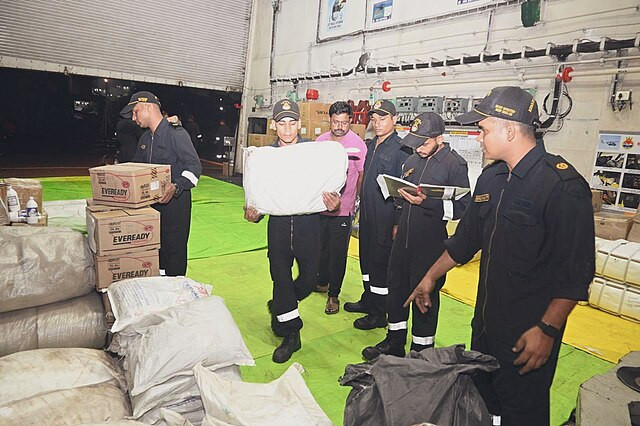A powerful 7.7 magnitude earthquake that struck Myanmar on Friday has left at least 1,644 people dead and more than 3,400 injured, with rescue teams scrambling to locate survivors amid widespread devastation and ongoing political instability. The tremor, the largest to hit Myanmar in decades, also caused fatalities in neighboring Thailand, where at least 10 people were confirmed dead, mostly from the collapse of a high-rise construction site in Bangkok.
In Myanmar, rescue efforts are concentrated in the heavily affected cities of Mandalay and Naypyitaw. The impact has been compounded by extensive infrastructure damage, including to airports and roads. Satellite imagery analyzed by Planet Labs PBC showed the control tower at Naypyitaw International Airport was sheared from its base. Communications remain spotty in many quake-affected regions.
According to the United Nations Office for the Coordination of Humanitarian Affairs (OCHA), hospitals and health facilities have sustained extensive damage. There is a "severe shortage of medical supplies," OCHA reported, including trauma kits, blood bags, anesthetics, and tents for displaced health workers. A convoy of 17 cargo trucks carrying shelter and medical aid is expected to arrive from China on Sunday.
The ruling military government, which seized power in a 2021 coup, has declared a state of emergency across six regions and issued a rare appeal for international assistance. Senior Gen. Min Aung Hlaing said Myanmar was ready to accept outside help. Countries such as China, Russia, India, South Korea, Malaysia, and Singapore have pledged aid. China sent 135 rescue personnel and pledged $13.8 million in emergency support, while Russia dispatched 120 rescuers and medical personnel.
The opposition-aligned National Unity Government, which has operated in exile since the coup, also issued a public statement announcing it would suspend offensive operations in earthquake-affected areas and work with international NGOs to facilitate aid. The group stated it would "collaborate with the U.N. and international nongovernmental organizations to ensure security, transportation, and the establishment of temporary rescue and medical camps," and emphasized it reserved the right to defend its forces if attacked.
Despite the emergency, military airstrikes reportedly continued in parts of Kayin and Shan states, areas near the quake's epicenter. Dave Eubank, founder of the Free Burma Rangers, told the Associated Press that "the Burma army keeps attacking, even after the quake."
In neighboring Thailand, the capital city of Bangkok experienced damage and casualties, particularly at a 30-story building site near the Chatuchak market. Bangkok Governor Chadchart Sittipunt said rescue teams would continue searching for survivors, adding, "We believe that there are still survivors. We will do everything possible to rescue them."
Brian Baptie of the British Geological Survey said the earthquake caused "intense ground shaking in an area where most of the population lives in buildings constructed of timber and unreinforced brick masonry," noting the high risk such structures face in major seismic events.
The earthquake has created a dual crisis for Myanmar, a country already burdened by internal conflict, displacement, and humanitarian need. According to U.N. estimates, more than 3 million people have already been displaced by civil unrest, with nearly 20 million in need of aid.
Efforts to deliver humanitarian assistance face obstacles not only from damaged infrastructure but also from limited access due to ongoing conflict between junta forces and various resistance groups. Aid organizations have called for unrestricted access to all affected regions to ensure equitable distribution of resources.
The European Union announced €2.5 million in emergency aid and is preparing to deploy further support. The United Kingdom pledged up to £10 million in assistance, and the World Health Organization warned of a "very, very big threat to life and health" as it readied further support. The U.N. has allocated $5 million from its Central Emergency Response Fund.
Many Mandalay residents are spending nights outdoors, either because their homes have been destroyed or out of fear of aftershocks. One survivor, 30-year-old Phyu Lay Khaing, was pulled alive from the rubble of a 12-story condominium more than 30 hours after the initial tremor, according to AFP.




